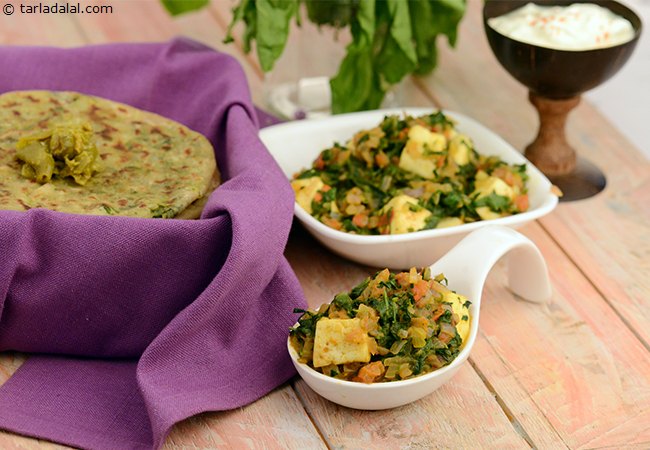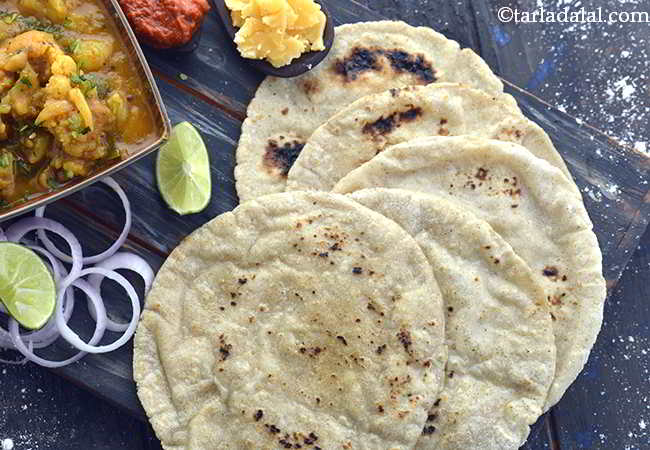Click here to see Suva Palak Methi Subzi recipe. Do those awesome greens tempt you in the market? Go ahead and pick all of them, and pump them into a delicious dish like this to top up on nutrients like iron, folic acid and antioxidants.
This awesome Suva Palak Methi Subzi brings together three different greens with common masalas to yield a fabulous subzi.
Chana dal gives more nutrients, as well as volume and a nice mouth-feel to this yummy dish, which pairs beautifully with hot phulkas.
Try your hand at making more such delicious and healthy dishes like Cabbage Masala , Methi Palak Paneer Subzi or Sprouted Kabuli Chana and Palak.

Methi Palak Paneer Subzi
Is Suva Palak Methi Subzi healthy?
Yes, this is good and healthy subzi. Spinach is one of the richest plant sources of Iron and it should be part of a healthy diet for everyone. They are good source of iron which is important for pregnant women as well as other individuals. Iron is a part of hemoglobin in the blood. Chana dal is heart and diabetic friendly, also rich in fiber.
Let's understand the Ingredients of Suva Palak Methi Subzi.
What's good in Suva Palak Methi Subzi.
Dill Leaves ( Suva bhaji, Shepu) : Our body needs to build white blood cells (WBC) to strengthen our immune system. Dill leaves with its loads of vitamin C helps us achieve this goal. Dill leaves are rich in antioxidants Vitamin A and Vitamin C which prevent or stop cell damage in your body and thus lowers the risk of chronic diseases like cancer, diabetes and heart disease. See detailed benefits of dill leaves.
Spinach (Palak) : Spinach is one of the richest plant sources of Iron and it should be part of a healthy diet for everyone. Raw spinach has 25% having soluble fiber and 75% insoluble fibre. Spinach is good for the heart, diabetics and eyes. Read this on the 17 benefits of spinach and why you should eat it.
Methi leaves (fenugreek leaves) : Methi leaves are low in calorie, powerful antioxidant and cures mouth ulcers. Fenugreek leaves help in improving glucose and insulin responses, hence good for diabetics. The levels of cholesterol also reduced with intakes of fenugreek leaves. Rich in Vitamin K which is good for bone metabolism. They are good source of iron which is important for pregnant women as well as other individuals. Iron is a part of hemoglobin in the blood. A deficiency of iron may cause anaemia and that may decrease your work ability and make you fatigue easily. See all benefits of methi leaves here.
Vegetable Oils : To some vegetable oil is only soyabean oil, while some promote it as a mix of oils like soyabean, canola, sunflower, corn and other omega-6 rich oils. These are often cheaper options than many oils, but they are highly processed oils. They are undoubtedly not to be reached out for, whether you are looking for salad dressings, sautéing or cooking. The 5 best oils used in cooking are olive oil (low temperature short time cooking), avocado oil, canola oil, coconut oil and peanut oil. You must read the super article to find the facts of which oil is the healthiest avoid vegetable oil.
Benefits of Cumin Seeds ( jeera) : The most common benefit of jeera known to many is to soothe the stomach, intestine and the entire digestive tract. Cumin seeds are apparently a very good source of iron. A tbsp. of cumin seeds can fulfil nearly 20% of days iron requirement. Even small quantity of cumin seeds has huge amounts of calcium – a bone supporting mineral. They aid is digestion, weight loss and help reduce inflammation. See detailed benefits of cumin seeds, jeera.
Mustard Seeds: Tiny little mustard seeds, mostly added as a tempering, lend an interesting bite, exotic flavour and tempting aroma to Indian foods. Mustard seeds are from the mustard plant, which is a cruciferous vegetable related to broccoli, Brussels sprouts and cabbage.
Hing ( Asafoetida) : The active compound 'coumarin' helps in managing blood cholesterol and triglyceride levels. Asafoetida is known to have anti-bacterial properties, which helps to keep asthma at bay. Asafoetida is an age-old remedy for bloating and other stomach problems like flatulence. The best solution is to gulp down little hing with water or dissolve it in water and sip it. It can also be used along with curd or almond oil as a hair mask. It helps to prevent dryness of hair and smoothen as well as strengthen hair.
Chana Dal ( split bengal gram) : One cup of cooked Chana Dal provides 33% of your protein for the day. Chana dal is heart and diabetic friendly, also rich in fiber. Chana dal has high amount of potassium and low amount of sodium which makes it very effective in regulating your blood pressure. Read this article on complete benefits of chana dal.
Ginger (Adrak) : Ginger is an effective cure for congestion, sore throat, cold and cough. It aids digestion and relieves constipation. Ginger was found as effective as drugs in relieving menstrual pain. Ginger is effective in decreasing the cholesterol levels in patients with high cholesterol. Ginger significantly reduces symptoms of nausea in pregnant ladies. See here for 16 Super Health Benefits of Adrak, Ginger.
Garlic : Garlic has been proven to lower cholesterol. The active ingredient allicin present in garlic aids in lowering blood pressure. Garlic is also alleged to help regulate blood glucose levels for diabetics. Garlic is great for the heart and circulatory system. Garlic has an antimicrobial, antiviral and antifungal function and can help in relieving common cold and other viral infections. To boost your immune system have a garlic clove a day. Garlic is a top anti viral food. The thiosulphate compound, Allicin found in garlic acts as a strong antioxidant and protects our body from damage of free radicals. Read here for complete benefits of garlic.
Green Chillies : Antioxidant vitamin C in green chillies protects the body from effects of harmful free radicals and prevents stress. It is probably the high fiber which helps in controlling blood sugar levels. This it is a welcome addition to a diabetic diet. Suffering from anaemia? Add green chillies to your list of iron rich foods too. For complete details see benefits of green chilli.
Tomatoes : Tomatoes are extremely rich source of Lycopene. Tomatoes are a powerful antioxidant, super rich in Vitamin C, good for heart. Tomatoes are a Pregnant women's friend and are rich in Folate or Folic Acid which helps your body to produce and maintain new cells, especially red blood cells. Read about 13 amazing benefits of tomatoes.
Turmeric Powder (Haldi): Turmeric helps in digestion of food thus helping to overcome indigestion. Haldi may help in reducing the growth of fat cells in the body. Turmeric, being rich in iron, is highly valuable in the treatment of anaemia and both the root as well as the powder should be a regular part of an anaemic diet. One of the health benefits of turmeric is it’s anti-inflammatory property due to the active compound, Curcumin, which helps to relieve inflammation of the joints and thus is a ladder to relieve pain related to arthritis. The curcumin in haldi also helps to ward of the bacteria’s causing cold, cough and throat irritation. Turmeric benefits in diabetes management by lowering blood glucose levels. Its antioxidant and anti-inflammatory effects are useful in the treatment of diabetes patients. It is known to be a good brain food and keep diseases like Alzheimer’s at bay. See here for detailed turmeric benefits.
Note : 1 cup = 200 ml (standard cup available in the market). The weight in grams varies for each ingredient.
Can diabetics, heart patients and over weight individuals have Suva Palak Methi Subzi ?
Yes, this recipe is good for diabetics, heart and weight loss. Fenugreek leaves help in improving glucose and insulin responses, hence good for diabetics. The levels of cholesterol also reduced with intakes of fenugreek leaves. Spinach is good for the heart, diabetics and eyes.
Suva Palak Methi Subzi is perfect for pregnant women. It's an excellent source of folic acid and it contains tomatoes.
Can healthy individuals have Suva Palak Methi Subzi ?
Yes, this subzi is good for all.
Suva Palak Methi Subzi is good for
1. Healthy Recipes Lifestyle
2. Weight Loss subzis
3. Diabetic Subzis
4. Healthy Heart Subzis
5. pregnancy
6. Kids weight loss
What is a healthy accompaniment to the Subzi?
We suggest a bajra roti, jowar roti, radish nachni roti recipe , basic ragi roti recipe, and whole wheat roti to make a healthy combination

Jowar Roti
Suva Palak Methi Subzi is high in
1. Vitamin C : Vitamin C is a great defence against coughs and colds.
2. Vitamin A : Vitamin A is crucial for healthy vision, cell growth and healthy skin.
3. Folic Acid : Folic acid is an essential vitamin required throughout pregnancy.
4. Fiber : Dietary fiber reduce the risk of heart disease, prevent the spike in blood sugar levels and hence super for diabetics. Consume more fruits, vegetables, moong, oats, matki, whole grains.
Note : a recipe is deemed high in a Vitamin or mineral if it meets 20% and above the recommended daily allowance based on a 2,000 calorie diet.
How to burn 115 calories that come from Suva Palak Methi Subzi?
| Walking (6 kmph) = |
35 |
mins |
| Running (11 kmph) = |
12 |
mins |
| Cycling (30 kmph) = |
15 |
mins |
| Swimming (2 kmph) = |
20 |
mins |
Note: These values are approximate and calorie burning differs in each individual.